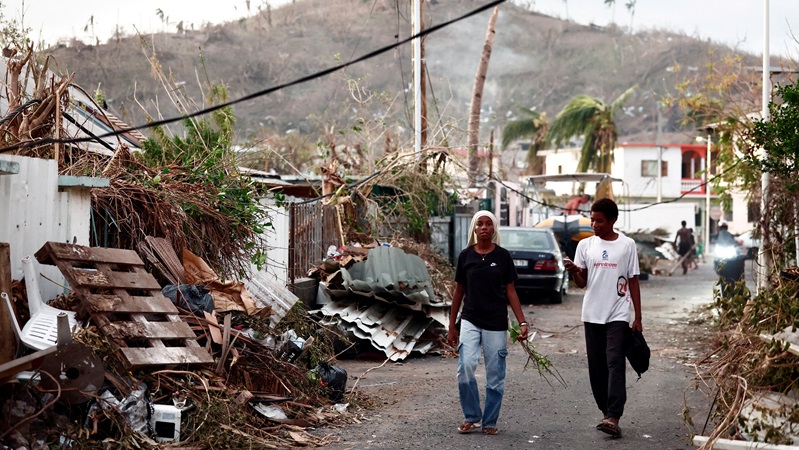Locals and experts say France should have done more to protect residents of its poor island territory from extreme weather
In the aftermath of Cyclone Chido, which battered the French overseas department of Mayotte on Saturday, locals and experts told Climate Home News that the government had not done enough to prepare the island territory off the east coast of Africa for the growing threat from powerful storms.
High winds, heavy rain and huge waves contributed to a death toll which authorities fear could rise from the current count of 31 to more than 1,000 on Mayotte’s two islands where many people – particularly tens of thousands of undocumented migrants – live in “banga” slums with tin roofs.
France’s interior minister, Bruno Retailleau, said Mayotte was “totally devastated” and about 70% of the population had been severely affected. The French Red Cross said the damage was “unimaginable”.
The cyclone was the strongest to hit Mayotte in at least 90 years, according to the Météo-France weather service, whose Francois Gourand said the storm was super-charged by particularly warm Indian Ocean waters.
On top of this, experts told Climate Home News that failures to adapt to climate change had worsened the impact of the storm. “The island was so fragile,” said one local official, who did not want to be named, explaining that the buildings were too weak to withstand the winds.
Researcher Emily Wilkinson, director of ODI Global’s resilient and sustainable islands initiative, said Mayotte’s plans to get residents to safety were not good enough.
During a visit to Mayotte starting on Thursday, French President Emmanuel Macron defended the government’s response to a crowd of angry locals, saying that the territory had been prepared for the cyclone. “There were warnings. The services were there,” he insisted, adding that a lot more aid in the form of food and water was on its way.
According to Reuters, he also told reporters on Friday that France had invested heavily in Mayotte but its institutions could not keep up with the arrival of migrants.
‘Second-class citizens’
Mayotte is geographically part of the Comoros archipelago off the east African coast near Madagascar, which was under French control from the 19th century.
In 1974, the four Comoros island groupings held popular votes on whether to become independent of France. Three overwhelmingly voted yes and formed a nation called the Union of the Comoros.
But Mayotte’s people said no, becoming an overseas community and then one of France’s five overseas departments a few decades later in 2011, with its people becoming French citizens and voting in French elections.
Despite its affiliation, Mayotte has remained much poorer than the rest of France and suffers from high rates of unemployment and crime. Nonetheless, its status as part of France has attracted migrants from places like Comoros and about a third of its population is said to be from outside Mayotte, many of whom live in dilapidated buildings in slums.
Recognising that its overseas departments are at risk from cyclones made worse by climate change, the French government has a special green fund which channels money to projects like reinforcing buildings in these vulnerable regions.
As of the end of 2023, the fund had contributed €1.35m ($1.4m) towards six projects in Martinique, Guadeloupe and La Reunion but none in the other overseas departments of French Guiana or Mayotte.
The official in Mayotte, who has experience of accessing climate funds, said there is a “lack of expertise at a local level” that prevents the territory tapping such support, adding that Mayotte had not been hit by a big cyclone for 50 years “so they don’t have any premonition about this situation”.
But Samira Ben Ali, a young climate campaigner from Mayotte who lives in Paris, accused the French government of ignoring warnings from local activists and politicians and not fulfilling promises to finance adaptation on the islands.
“What is happening in Mayotte now is definitely a failure of governance from France,” she told Climate Home. “It really feels like we’re second-class citizens.”
Wilkinson said advanced economies like France are “not taking adaptation seriously” in comparison with efforts to cut planet-heating emissions because “they’re not thinking about parts of their territory which are located in more climate-sensitive regions”.
The adaptation projects that do exist are focused mainly on protecting mainland France rather than overseas territories, she said – “and that’s a real gap”.
Shut out of climate funds
As part of a developed country like France, Mayotte is not eligible to submit projects to UN climate funds like the Green Climate Fund, the Adaptation Fund or the new Fund for Responding to Loss and Damage.
“From the perspective of other vulnerable countries, they would argue that these territories should be receiving support directly from central governments of the UK, France, the Nethe
Read More

